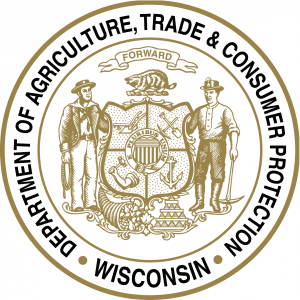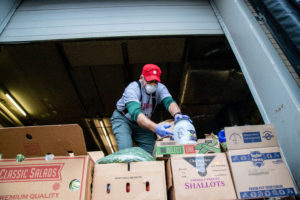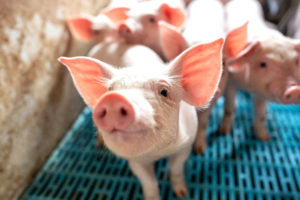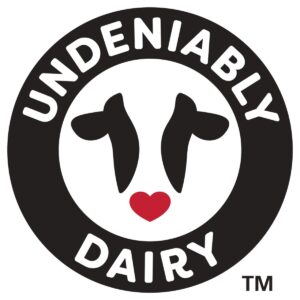Ag Day at the Capitol Set for January 31
Ag Day at the Capitol will be held January 31 at the Monona Terrace in Madison. This event is the largest gathering of farmers from across the state representing a variety of farm groups to learn more about issues impacting Wisconsin agriculture and meet with their state legislators.
“Wisconsin Farm Bureau is proud to host this opportunity for farmers to share their voices at the Capitol alongside many other agricultural groups,” said WFBF President Brad Olson. “There is no greater way to make a difference in agriculture than taking the time to meet with legislators to directly share our stories.”
Registration will begin at 11 a.m. with the program starting at 11:30 a.m. Lunch will be served followed by issue briefings and time for attendees to visit their legislators in the Capitol.
It is important that attendees call the offices of their legislators in advance to schedule an appointment between 3 and 5 p.m. for Wednesday, January 31.
Early registration is $30 and is now available. Registration increases to $60 after January 25 and at the door. Register for Ag Day at the Capitol by visiting bit.ly/AgDay-WFBF.
Wisconsin Now Has 49 Ag Enterprise Areas
DATCP designated more than 21,000 acres in Green Lake and Sauk counties as new agricultural enterprise areas. The department also designated a modification to expand an existing AEA in Monroe County by more than 20,000 acres.
With these additions, there are now 49 AEAs statewide totaling 1,619,566 acres. They cover portions of 30 counties, 135 towns, and the Bad River Reservation.
AEA designations support local farmland protection goals, the agricultural economy, environmental efforts, and rural prosperity, DATCP says. Landowners within AEAs are eligible to enter into voluntary farmland preservation agreements. They can commit all or a portion of their farm to agricultural use and maintain soil and water conservation standards. In return, they may be eligible to claim the annual farmland preservation tax credit.
The new AEAs include:
- Dellona AEA, Sauk County, includes more than 8,000 acres in the town of Dellona. Local governments and partners joined 11 landowners to petition for designation of this AEA. Petitioners hope to promote soil health principles and create a community for farmers to support financial and environmental stability.
- Marquette AEA, Green Lake County, includes more than 13,000 acres in the towns of Marquette, Green Lake, and Kingston. Local government and partners joined seven landowners to petition for designation in this AEA. Petitioners hope to promote small scale agriculture and support regenerative agricultural practices to preserve their agricultural resources.
The modified AEA includes:
- Scenic Ridge and Valley AEA, Monroe County, includes more than 20,000 new acres, for a total of more than 83,000 acres in the towns of Leon, Jefferson, Wells, and Portland. Local government and partners joined 42 landowners to petition for modification of this AEA. Petitioners hope to continue the strong history of farmers protecting soil and water resources within the La Crosse River watershed.
DATCP is accepting petitions to designate new or modify existing AEAs through Aug. 2. Find more information: https://datcp.wi.gov/Pages/Programs_Services/FarmlandPreservation.aspx
Dollars Available To Expand Food Supply Chain
The two Resilient Food Systems Infrastructure Program grants, the Infrastructure Grant and the Equipment-Only Grant, are accepting applications.
The dollars come from a cooperative agreement between the Department of Agriculture, Trade and Consumer Protection and the U.S. Department of Agriculture. A total of $27 million is available.
RFSI grant projects must expand middle-of-the food supply chain capacity for locally- and regionally-produced foods and offer more and better market opportunities to small- and mid-sized agricultural producers, including those who may not have access to value-added opportunities or processing to meet market demand for premium or value-added products, such as underserved producers.
Find application materials: https://datcp.wi.gov/Pages/AgDevelopment/RFSI.aspx
Infrastructure Grant
These grant awards will range from $100,000 to $3 million.
This grant can fund capital investments such as construction, equipment, and building renovations. The grants can also fund facility design or engineering, staff time, modernizing systems, plan development, and market development. A match is required for Infrastructure Grants and starts at 50 percent of the total project cost. However, if the main applicant qualifies as underserved, the match requirement will be reduced to 25 percent of the total project cost.
Equipment-Only Grant
These grant awards range from $10,000 to $99,999.
This grant can only fund equipment, such as delivery vehicles, frozen or refrigerated storage, value-added food processing equipment, or other equipment for middle-of-the food supply chain activities. Equipment may be new, used, or refurbished. No match is required.
More Information
An informational webinar about applying for the RFSI grants is Jan. 9 at 11 a.m. via ZoomGov. Register: https://www.zoomgov.com/meeting/register/vJItc-2vqzsoHtBdKiBNr_W67dczjIS6MYs#/registration
DATCP will host open office hour sessions to answer specific RFSI grant questions on these dates:
- Jan. 18 at 1 p.m.
- Feb. 1 at 1 p.m.
- Feb. 15 at 1 p.m.
- Feb. 29 1 p.m.
Register: https://www.zoomgov.com/meeting/register/vJItde6qrzgiGbLPBAcgUAvVkvhltNuiGqE#/registration
Burkhamer Elected to NMPF Board
Foremost Farms USA, a world-class producer of cheese, butter and dairy ingredients supplied to national and international markets, announced its Chairman of the Board Rick Burkhamer of Richland Center, Wisc., has been elected to the National Milk Producers Federation’s (NMPF) Board of Directors and Executive Committee.
Burkhamer will help shape the strategic direction and also policy initiatives of NMPF. His extensive experience and visionary leadership within the dairy industry make him an ideal addition to the NMPF’s leadership team.
“I am honored to serve the members of Foremost Farms. This is an opportunity to contribute to the growth and development of our dairy industry,” said Burkhamer. “I look forward to collaborating with industry leaders to address our challenges as well as drive positive change.”
Greg Schlafer, President and CEO of Foremost Farms, will also continue to serve as an active member of the Board of Directors at NMPF. This dual representation reinforces Foremost Farms’ dedication to industry collaboration and its active participation in advocating for members and shaping industry policies and standards.
“Being a part of the Board of Directors allows Foremost Farms to contribute to the broader industry conversation,” said Schlafer. “It is a privilege to continue working in this capacity, now alongside Rick, to advance our industry’s interests.”
ATV/UTV Riders: Beware Of Winter Conditions
The Wisconsin Department of Natural Resources (DNR) urges ATV/UTV riders to be mindful of potentially dangerous winter conditions when operating recreational vehicles during the extended riding season.
Many of the state’s trails have yet to be covered in snow, but just because a winter road or trail is legally open for riding doesn’t mean it’s safe. Frost, ice and fresh snow can cause slippery conditions. UTVs and ATVs may have great traction off roads, but that can change when they are driven on roadway routes in winter.
“Be extra careful, especially when slowing down and approaching turns,” said Lt. Warden Jacob Holsclaw, DNR Off-Highway Vehicle Administrator. “Nothing stops fast on slippery pavement, and these machines do not handle the same as a car or a truck.”
In 2023, there were 32 fatal ATV/UTV crashes in the state, the most recent of which happened on Dec. 31. The consumption of alcohol or drugs, excess speed, driver inexperience and operator error are leading causes of fatal crashes.
Here are a few more safety tips to keep in mind when operating your off-highway vehicles during winter:
- Never consume alcohol or drugs before or during your ride.
- Always wear a DOT-approved helmet.
- Always wear a seatbelt in a UTV.
- Remember, no ice is 100% safe. Warmer than usual winter temperatures have created hazardous ice conditions, and extra caution is necessary.
- Do not travel in unfamiliar areas.
- Let someone not riding with you know where you are going and when you will return.
- Follow all posted speed limits and regulatory signs.
- Dress for the weather and carry additional safety gear such as a life jacket, ice picks and dry clothes when operating on the ice.
- Double-check before operating on trails. Many trails open to ATVs/UTVS are closed during winter in anticipation of snowmobile season.
Wisconsin law requires ATV and UTV operators born on or after Jan. 1, 1988, who are at least 12 years old for an ATV (and at least 16 years old for UTV) must complete an ATV safety certification course to operate in Wisconsin (exception: on private property owned by operator’s immediate family). These safety courses can be taken online or in person. A list of approved safety education classes is available on the DNR Safety Education webpage.
Wisconsin law also requires every operator involved in a crash incident to report the incident without delay to law enforcement officials. Operators must submit a written report to the DNR within 10 days of the incident.
For more information about ATV and UTV recreation in Wisconsin, visit the DNR’s ATV/UTV Riding in Wisconsin webpage.
Winter Weather May Influence Hog Prices
Jeff Swenson, DATCP livestock and meat specialist, prepared and wrote the following market update. It draws information from several sources, including trade publications, radio broadcasts, agricultural news services, individuals involved in the industry as well as USDA reports. Edited by Mid-West Farm Report.
Wisconsin’s sow herd on Dec. 1 was 8 percent smaller than the previous year. A total of 47,000 breeding hogs were reported on Wisconsin farms, compared to 51,000 a year ago. The nation saw a 3.3 percent decrease, according to the latest Quarterly Hogs and Pigs report.
The number of market hogs in Wisconsin was 313,000, according to the report. This was a large enough increase for total pigs in the state to grow by 4 percent over a year ago. The average pigs saved per litter was down 1 percent, averaging 11.9. That compares to a national average of 11.66 pigs saved.
Cash hogs were lower last week, and the pork cutout value fell $1.61 to average $82.96. The cutout was weaker this week. Much like beef, we expected a post-Holiday drop in demand. Lean hog futures are showing strength causing some optimism for higher cash pig prices heading into the heart of winter. Hog and pork movement will also be impacted by the forecasted winter storms should they develop.
Last week’s hog harvest estimate totaled 2.233 million and that is 187,000 less than the week before and 49,000 more than last year. The harvest estimate included a Saturday harvest of 319,000 head leading into the shortened week.
Team Looks At Turning Plant Waste Into Plastic
Photo by James Runde.
A team at UW-Madison has a plan to turn plant waste into plastic. Some of the goals are to cut greenhouse gas emissions and create economic opportunities in rural Wisconsin.
The Wisconsin Energy Institute got $4 million from U.S. Department of Energy to turn a fibrous plant material called lignin into nylon. Nylon is in textiles, carpets and molded plastic. However, the project needs to make plant-based nylon for roughly the same cost as the petrochemical version but with only a fraction of the pollution.
If successful, the project will demonstrate the commercial viability of a lab-tested process that could be key to developing sustainable alternatives to fossil fuels. This is according to Shannon Stahl, a UW-Madison professor of chemistry who is leading the project.
“If you’re really going to replace petroleum with bio-based feedstocks, everything from plants has to be turned into value,” Stahl says. “The approach must be like petrochemicals, where everything from crude oil is turned into something of value. The goal is to adapt the petrochemical model to a biochemical context.”

Image Credit: Matthew Wisniewski
But, the project aims to go beyond the engineering challenges. It incorporates a plan to collaborate with communities disproportionately affected by pollution and economic hardship.
Prof. Morgan Edwards will work with researchers to develop screening tools to guide the siting of biomass processing facilities. She says the goal is to ensure equitable distribution of both the benefits and burdens of energy infrastructure.
For example, Stahl says the sites could be located in communities in Wisconsin where paper mills have closed.
The grant is one of five. DOE’s Bioenergy Technologies Office awarded the grants as part of an initiative to advance the production of affordable biofuels and biochemicals that can reduce greenhouse gas emissions.
Dairy Checkoff Reflects On 2023 Milestones
Dairy Management Inc. has announced significant outcomes in 2023 on behalf of America’s dairy farmers and importers.
“This past year, we built on our collective successes while defining the next chapter of the checkoff’s history,” says DMI President and CEO Barbara O’Brien. DMI manages the national dairy checkoff program.
O’Brien is also the president and CEO of the Innovation Center for U.S. Dairy, a voluntary organization that works across the dairy value chain to foster collaboration and progress to advance U.S. dairy’s interest. She explains that ASPIRE is the acronym for DMI’s strategic areas of focus: Sustainability, People, Innovation, Reputation, and Exports.
“Staffs at local, national and international levels have worked together to deliver meaningful results and ensure funders see a whole new level of transparency and accountability for their investment,” she says.
A few of the highlights include:
Sustainability
- The checkoff actively engaged in research and piloted technologies to offer economically viable sustainability solutions for farmers.
- The Feed in Focus program, which involved 31 farms, covered more than 9,000 acres and 20,000 cows. It disbursed nearly $500,000 in farmer incentives.
- More than $10 million in new commitments from external partners and organizations were secured for the Net Zero Initiative programs. These target 2050 environmental goals, including $7.2 million in Greener Cattle Initiative grants.
- The Innovation Center bolstered engagement and collaboration with 39 companies representing 75 percent of the milk supply joining the U.S. Dairy Stewardship Commitment, and a significant increase in participation at various sustainability convening meetings.
Innovation
- More than 200 million milk equivalent pounds of growth were achieved through partnerships with major foodservice brands. These include McDonald’s McFlurries and the new Grimace shake, Domino’s Loaded Tots and Stuffed Cheesy Bread, and Taco Bell’s Grilled Cheese Burrito, now a permanent menu item, and the rollout of frozen beverages.
- The checkoff activated three major growth landscapes in health and wellness, foodservice, and beverage, inspiring innovation across the industry.
- Collaborations with Mayo Clinic, University of California-Davis, and Cornell have led to significant advancements in dairy research.
Innovation Center for U.S. Dairy
Advanced U.S. dairy’s collective engagement and progress within the pre-competitive social responsibility areas important to consumers and customers, including:
- Increased U.S. Dairy Stewardship Commitment adopters to 39 companies representing 75 percent of the milk supply.
- Increased membership within the Dairy Sustainability Alliance to 200 member companies and organizations.
- Achieved strong attendance and engagement at key industry and broader agricultural meetings including the Dairy Sustainability Alliance Fall meeting (335 attendees) and the Sustainable Ag Summit (record attendance of 925 people).
Reputation
- “See Dairy Differently” Campaign challenges consumer and thought leader misconceptions about dairy production and has garnered over 180 million impressions.
- Strategic content planning has drawn more than 4.3 million views from 3.1 million users to USDairy.com.
- Leveraging dairy nutrition and environmental science, stories about farmers and sustainable production, popular trends and recipes, the checkoff secured media placements in major and local outlets reaching nearly 2.7 billion readers.
- Collaborations with Mayo Clinic and National Medical Association enhanced the reputation of dairy in health and science circles.
Exports
- Despite challenges, there has been a significant increase in exports. One example is through a partnership with Yum China to grow U.S. cheese use, delivering 10.84 million cheese pounds so far.
- Shift focus from mainly short-term promotional support to include permanent menu innovation and new products. This includes Domino’s Pan Pizza launching in Saudi Arabia and UAE, which utilizes 20 percent more U.S. cheese. In addition, AMPI’s Dinner Bell Creamery premium processed cheese expanded across specialty burger chain menus in China.
“We had an amazing year of momentum and progress,” O’Brien says. “The focus for 2024 remains on delivering short-term demand and sales at the same time we’re building the pipeline for future growth through science and innovation. And we’ll continue to engage farmers from across the country—securing their input, listening to feedback, sharing the work and results in a way we know resonates.”
USDA To Host Open House for Emerging Farmers
The Dunn County United States Department of Agriculture (USDA) Office, in partnership with Go Farm Connect, will be hosting an in-office meet-and-greet event on Tuesday, January 9. At this event they will introduce farmers to financial and technical resources that can help their businesses grow. The event will be held in the USDA Office at 390 Red Cedar St, Menomonie. Refreshments will be provided, and language interpretation services will be available upon request. Residents and staff of Eau Claire, Chippewa, and Barron counties are also encouraged to attend.
The Farm Service Agency (FSA) and Natural Resources Conservation Service (NRCS) offer a wide variety of farm loans and programs. These include crop insurance, infrastructure cost-shares, and planning tools that benefit farmers and landowners. Bonnie Warndahl of Go Farm Connect and staff from both FSA and NRCS welcome farmers—no matter how large or small their operation—to the event. Attendees can pre-register for this event at gofarmconnect.org.
Many farmers don’t know that they qualify for USDA services that can positively impact their farm business. For example, FSA offers low-interest loans to farmers. This can be used for start-up costs, expansion, equipment purchases, building a storage facility, and more. NRCS has programs that help with conservation plans, cover crop plans, grazing plans, and much more, as well as cost-share assistance for infrastructure like high tunnels and livestock watering systems.
DCHA Offers Two $1,000 Scholarships
Due to generous support from auctioning off the original Bonnie Mohr painting – “Enchanted Pastures” – the Dairy Calf and Heifer Association (DCHA) will award an additional $1,000 scholarship in 2024.
To be eligible for one of DCHA’s $1,000 scholarships, applicants must be a college student and DCHA member; or the parent/legal guardian must belong to DCHA. Applications are due Feb. 21. An individual may only receive a DCHA scholarship once.
To apply for the scholarship, applicants must:
• Complete at least one year of post high school education
• Be an enrolled student in good standing at an accredited college or university
• Be enrolled in a field of agriculture (e.g., dairy science, animal science, veterinary science, agricultural technical program, ag communications) or in a course of study with relevance to agriculture (preference is given to dairy calf/heifer-related fields of study)
• Be a DCHA member; or the son, daughter or legal dependent of a DCHA member
Applications must be received by end of business day on Wednesday, February 21, 2024. Email completed applications to jodee@calfandheifer.org.
Go to: https://calfandheifer.org/scholarship for more information and to apply.











